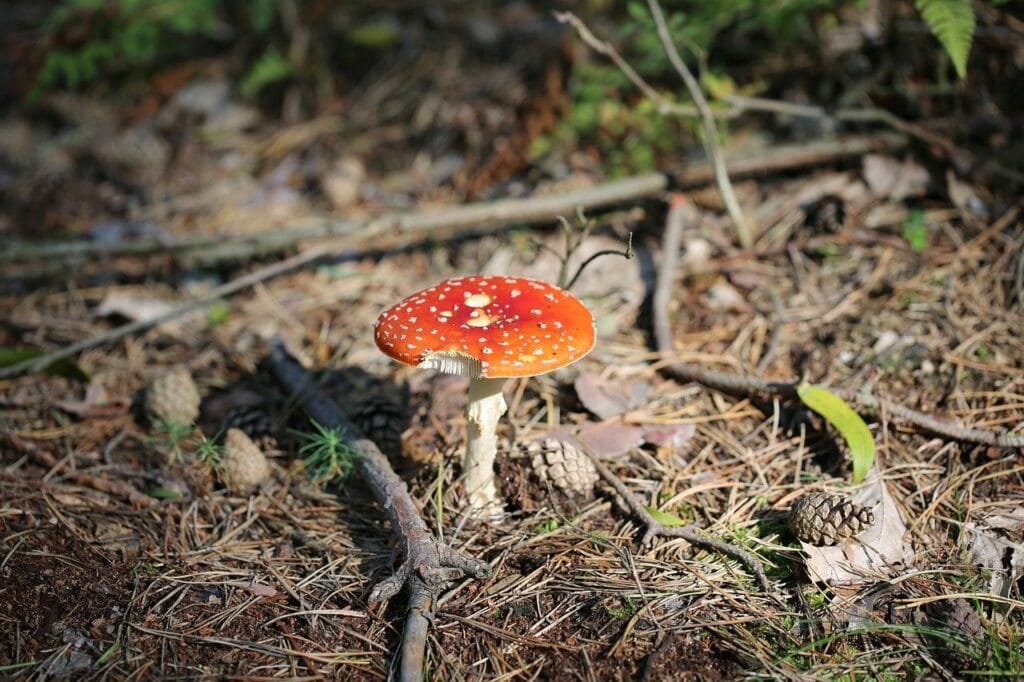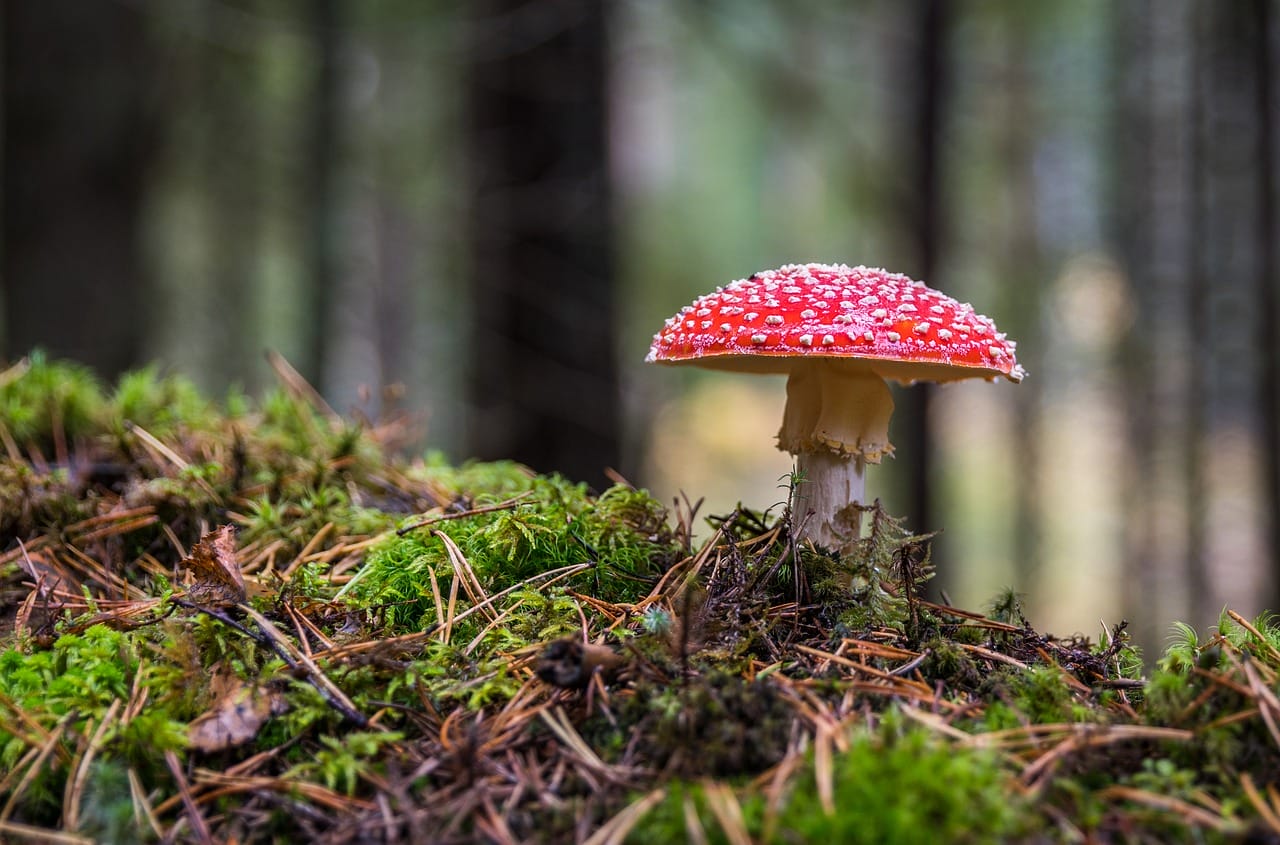Over millennia, humans have observed and intentionally utilized the psychedelic attributes of specific plants and fungi.
Among these, fungi, especially magic mushrooms, are identified as the primary natural supplier of psychedelic substances.
The psychedelic compound psilocybin, originating from mushrooms, holds a notable position in history, being incorporated into religious ceremonies and healing practices.
Many researchers are dedicating their work to explore the potential health benefits of shrooms online. Current studies have shed light on the effects of psilocybin mushrooms. These findings bring hope to many people, prompting a discussion on the necessity of their integration into Canada’s healthcare system.
Main Takeaways:
- Magic mushrooms, containing the psychoactive substance psilocybin, present numerous potential benefits for addressing mental health concerns in Canada.
- When compared to opioids, psilocybin exhibits a safer profile with a lower risk of addiction and toxicity.
- Psilocybin demonstrates long-term efficacy in treating depression, with effects that can persist for up to a year.

A Closer Look at Psilocybin
Psilocybin, an indole-alkylamine (tryptamine) derived from magic mushrooms, bears structural similarities to lysergic acid diethylamide (LSD). Its effects encompass hallucinogenic and euphoric experiences, likely due to its interaction with serotonin (5-HT) receptors in the central nervous system.
Given its interaction with serotonin receptors, high-quality magic mushrooms show a unique potential to aid in managing mental health disorders.
Addressing Canada’s Mental Health and Opioid Crisis
Widespread Mental Health Disorders in Canada & Treatment Resistance
| 2012 | 2022 | |
| Major Depressive Episodes | 4.7% | 7.6% |
| Generalized anxiety disorder | 2.6% | 5.2% |
| Social phobia | 3.0% | 7.1% |
| Alcohol use disorder | 3.2% | 2.2% |
Nearly 36.6% of individuals suffering from mood, anxiety, or substance use disorders reported that their healthcare and mental health needs were either unmet or not adequately addressed.
An article published in the Canadian Journal of Psychiatry offered a glimpse into the treatment-seeking behaviors of patients diagnosed with depression. The researchers thoroughly examined 1282 patient records from 135 practitioners. They identified 263 patients with treatment-resistant depression (TRD), which translates to a prevalence rate of 21.7% across the country.
Opioid Crisis
Chronic pain affects around 8 million Canadians, or one in every five individuals. If not effectively managed, chronic pain can negatively impact various facets of a person’s life.
Healthcare providers often recommend the use of opioids for pain control. While opioids may provide benefits like pain relief and improved functionality, they also come with potential hazards.
Between January 2016 and March 2022, there were at least 30,843 recorded deaths related to opioid toxicity in Canada. A significant number of these tragic occurrences took place in early 2021, with a staggering 5,368 cases reported. It’s significant to note that the vast majority, more than 88%, of these incidents happened in the provinces of British Columbia, Ontario, and Alberta.
For Major Depressive Episodes
In a research published in the Journal of Psychopharmacology, 27 people with a long history of depression were enlisted. Most of these individuals had been dealing with depressive symptoms for approximately two years prior to the study. 88% of these participants had previously been prescribed traditional antidepressants, and 58% were still using these medications during their depressive periods.
The study found significant reductions in depression in both groups following psilocybin treatment. Furthermore, they observed that the severity of depression consistently remained low at the one, three, six, and 12-month follow-ups post-treatment.
For General Anxiety and Social Phobia
A case study that appeared in the Croatian Medical Journal in October 2021 probed HTML:
The narrative revolves around a
A 16-year-old boy, struggling with severe anxiety, social isolation, and deteriorating academic performance sought help at a mental health clinic. His challenges were exacerbated by a learning disability and lack of enthusiasm for schoolwork, which made group therapy overwhelming and ineffective for him.
Over the course of 18 months, after three sessions of psilocybin therapy, significant improvements were observed. His anxiety lessened, and his communication skills with peers and teachers bettered. He began to express his feelings more openly, engaged actively in group therapy, and enjoyed improved interpersonal relationships.
In the Context of Alcohol Use Disorder
A recent clinical trial detailed in a study published in JAMA Psychiatry on August 24, revealed the potential of using a combination of psilocybin and psychotherapy to treat alcohol use disorder. The progress of 93 patients suffering from the disorder was monitored for a period of 32 weeks.
Of the total, 48 individuals who participated in psilocybin-assisted therapy experienced a significant 83% reduction in alcohol consumption within eight months of their initial dose. This is in comparison to a 51% reduction in the placebo group. Nearly half of the individuals who received psilocybin ceased drinking completely.
Addressing the Opioid Crisis
Elena Argento, a postdoctoral fellow at the University of British Columbia and BC Centre on Substance Use, is investigating the therapeutic use of psychedelics.
Argento explains that psilocybin contributes to reducing addiction risks in two ways: it impacts both neurobiology and psychology. She underscores the transformative experiences psychedelics can create, characterized by profound feelings of awe and self-transcendence. These experiences often aid individuals in discovering new meanings and goals in life, which can potentially lead to behavioral changes, specifically concerning addiction.
In a recent study led by Argento and the BC Centre on Substance Use, the results showed a marked decrease in the probability of sustained daily illicit opioid use among those who had utilized psychedelics recently or within the past six months.
Argento’s 2018 study also suggested that psychedelic usage acted as a protective factor against the correlation between prescription opioid use and suicide risk.
Another study found links between psilocybin usage and a reduced risk of opioid use disorder. This prior research highlighted a 40% decrease in the risk of opioid misuse and a 27% lesser risk associated with opioid dependence over the over the previous year as a result of psychedelic utilization.
The Necessity for Health Canada and Other Regulatory Bodies to Assess Psilocybin as a Component of Canada’s Therapeutic Approach
Although Psilocybin has been recognized for its potential positive influence on the mental well-being of Canadians, it remains challenging to obtain. Health Canada allows healthcare practitioners to prescribe this treatment under the Special Access Program. However, the program’s stringent guidelines present a significant barrier for many professionals and patients.
The therapeutic use of psilocybin-infused mushrooms could revolutionize mental health care in Canada, offering potentially transformative benefits. Rather than depending on traditional treatments like pharmaceuticals or opioid replacement therapy—which often prove less effective—psilocybin therapy presents an alternative with the potential for profound and long-lasting effects.
Data indicates that psilocybin therapy might provide enduring benefits, potentially saving patients substantial costs on ineffective treatments. Additionally, research suggests that psilocybin is relatively safe, featuring low toxicity, minimal risk of misuse, and infrequent overdose incidents.
Where is Psilocybin Available for Online Purchase?
If Canadians encounter difficulties in accessing psilocybin therapy, they can opt to purchase magic mushrooms online to alleviate their current conditions. They can browse through a range of magic mushroom products, from high-dose shrooms to microdose magic mushrooms.
High-dose shrooms encompass psychedelic mushrooms available in various forms, such as dried magic mushrooms, edibles, or beverages, consumed for their hallucinogenic and therapeutic properties.
Microdosing magic mushrooms refers to products containing small amounts of magic mushrooms. These products come in capsules, shroom edibles, or shroom tea. Buying shrooms online offers an alternative way to subtly experience the benefits of these mushrooms. Shrooms Toronto Canada focuses on offering premium magic mushrooms online, ensuring the highest quality.
Is Psilocybin a Viable Option for Canadian Healthcare?
Psilocybin, often misunderstood due to its recreational use, is safer compared to opioids and other drugs typically prescribed in healthcare settings.
There’s a growing body of evidence suggesting its potential benefits—similar to those of marijuana—in treating various mental health conditions. dimensions of reality.
Magic mushrooms, from a wellness standpoint, are used as supportive therapy for mental health treatments and to enhance personal development.
What potential risks and side effects could magic mushrooms have?
Magic mushrooms can trigger a range of both positive and negative effects. These might encompass hallucinations, altered perception, and psychological transformations. On the flip side, they might induce nausea, dizziness, and in rare instances, psychological distress. It’s of utmost importance to approach the consumption of magic mushrooms with prudence and reverence, acknowledging the potential risks associated. Always consult a healthcare provider before embarking on any new regimen involving magic mushrooms.
Is ordering magic mushrooms online safe?
Yes, purchasing magic mushrooms online can be safe, given that you select a trustworthy source. It’s crucial to undertake comprehensive research about the product, brand, and the online dispensary prior to making a purchase. Customer reviews and ratings can provide valuable insights into product quality and service reliability. Always opt for dispensaries that place a high emphasis on customer safety, satisfaction, and offer secure payment methods.
Can I cultivate my own magic mushrooms?
Yes, home cultivation of magic mushrooms is feasible and can be a rewarding endeavour. Nonetheless, it necessitates specific conditions and comprehensive knowledge of the cultivation process. Numerous kits and guides available online can aid you in your mushroom cultivation journey. But, be mindful that the legality of growing magic mushrooms is subject to local laws and regulations.
experiences. In the wellness community, some individuals opt for a more measured approach, consuming small quantities of mushrooms to harness their benefits without experiencing hallucinations.Articles That Might Interest You:





